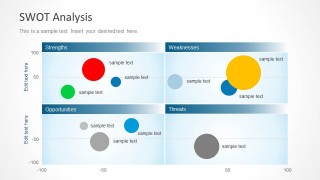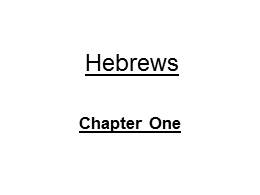Learn more how to embed presentation in WordPress
Copy and paste the code below into your blog post or website
Copy URL
Embed into WordPress (learn more)
Comments
comments powered by DisqusPresentation Slides & Transcript
Presentation Slides & Transcript
Hebrews
Chapter One
The Author Of Hebrews
Hebrews was written around 67-69 A.D.
The author to the Hebrews is unknown although some believe it to be Paul
The author Knew Timothy (13:23)
The author is well educated in both the Greek language and the Old Testament
The best conclusion according to Origen, an early church theologian, in the third century stated, "only God knows for sure who wrote Hebrews."--(Spirit Filled Life Bible)
The Reason For Hebrews
The author states the reason in Hebrews 13:22, as an exhortation, which is to encourage one to action
It is written to Jewish believers and is heavy in Jewish knowledge and Old Testament Insight
When reading Hebrews we should read it in light of the context and culture to which it is written
The point of Hebrews is keeping the Jewish believer in Christ from lapsing back into the sacrificial system of Judaism
Hold Fast The Confession
"Therefore, brethren, having boldness to enter the Holiest by the blood of Jesus, by a new and living way which He consecrated for us, through the veil, that is, His flesh, and having a High Priest over the house of God, let us draw near with a true heart in full assurance of faith, having our hearts sprinkled from an evil conscience and our bodies washed with pure water. Let us hold fast the confession of our hope without wavering, for He who promised is faithful.
And let us consider one another in order to stir up love and good works, not forsaking the assembling of ourselves together, as is the manner of some, but exhorting one another, and so much the more as you see the Day approaching. For if we sin willfully after we have received the knowledge of the truth, there no longer remains a sacrifice for sins, but a certain fearful expectation of judgment, and fiery indignation which will devour the adversaries. Anyone who has rejected Moses' law dies without mercy on the testimony of two or three witnesses. (Deut. 17:2-6)
Of how much worse punishment, do you suppose, will he be thought worthy who has trampled the Son of God underfoot, counted the blood of the covenant by which he was sanctified a common thing, and insulted the Spirit of grace?"--Hebrews 10:19-29
Echoing God
Confession, Homologeo: Echoing the same words
In the context of Scripture it means saying what God says about us or to agree with God
The written Word becomes the living Word as we declare with our lips the Word of God
A relationship is forged with the Living Word through the written Word
Three Parts of Confession
Assent: Agree to the truth of something
Consent: Submit to the truth revealed
Express: Put into action the revealed truth
Putting these three aspects together is what it means to “hold fast our confession” of what God’s word says---I believe it is true, it is true for me, and I declare it to be true in my life
Let us hold fast the confession of our hope without wavering, for He who promised is faithful.
Key Themes
Jesus' superiority and sacrifice: The word "better" is used thirteen times in the letter to the Hebrews and stresses that Jesus is better then: The angels, the law, the sacrificial system, the old covenant, and the priestly system
Jesus is the fulfillment of all of the old covenants through His sacrifice
Jesus is the great High Priest who can sympathize with man because He was fully human but unlike the priests of old Jesus offered Himself for man, not the blood of goats and bulls
Outline Of Hebrews
Hebrews 1-2: Jesus is better than the angels both in His deity and His humanity.
Hebrews 3: Jesus is better than Moses.
Hebrews 4: Jesus is better than Joshua.
Hebrews 5, 6, 7: Jesus is better than Aaron.
Hebrews 8: Jesus offers a better covenant.
Hebrews 9: Jesus offers a better Tabernacle.
Hebrews 10: Jesus offers a better sacrifice.
Hebrews 11: Faith is better and pleases God
Hebrews 12: Following Jesus is a better option
Hebrews 13: It is better to live a life in Jesus
The Three Distinct Groups
The Bible is written to the Jews, the Gentiles, and the Church of God
Keep in mind when reading the New Testament which group of persons the context is addressing
The Bible is written to a particular people at a particular time in a particular context, but its application is for all people for all time
Hebrews 1:1
God, who at various times and in various ways spoke in time past to the fathers by the prophets
God
Hebrews begins by simply stating the self-evident fact that there is a God
The Hebrew author does not offer proofs for God's existence. The author simply knows He is
God's existence is simply stated through out scripture
"The fool has said in his heart, There is no God."-- Ps 14:1
God is there and He is not silent (Schaeffer)
God Has Spoken At Various Times
At the core of this first verse in Hebrews is the fact that God has spoken.
If God had not spoken man would be left to a minimum revelation of creation--Romans 1:18-21
God spoke at creation
God spoke to Adam
God spoke to Noah
God spoke to Abraham
God spoke through the prophets to the people
God Has Spoken In Various Ways
God spoke to Moses by a burning bush-Ex. 3:2
God spoke to Elijah by a still, small voice-1 Kings 19
God spoke to Isaiah by a heavenly vision-Is. 6
God spoke to Job through a whirlwind-Job 38:1
God spoke to Hosea through a Harlot-Hosea 1:2
God spoke to Amos through a basket of fruit-Amos 8:1
God Has Spoken Through The Prophets
The prophets are the means by which God speaks His revelation to the people
"The revelation given through the prophets was brought in various ways - sometimes through parables, historical narrative, prophetic confrontation, dramatic presentation, psalms, proverbs, and the like." [Guzik]
God desires a relationship with man and in times past has spoken to man through the prophets
The Inspiration of the Prophets
"….we have the prophetic word confirmed, which you do well to heed as a light that shines in a dark place, until the day dawns and the morning star rises in your hearts; 20 knowing this first, that no prophecy of Scripture is of any private interpretation, 21 for prophecy never came by the will of man, but holy men of God spoke as they were moved by the Holy Spirit."--- 2 Peter 1:19-21
The Role Of The Prophets
The prophet's job was to call the people back to God and to the truth of God. It involved warning them of the consequences of their actions and a call to repentance. At times it was a message of God's plan for the future of His Kingdom. They were men through whom God spoke His message of love for sinners, and warned them of the consequences of their sins. The heart of their message was God's promise of eternal redemption through the coming of Jesus Christ the Messiah.
The Uniqueness of the Prophets
They were sent from God. These men claimed to be speaking from God and for God. "Thus says the Lord" ( occurs more than 3800 times in the Old Testament) was a clear emphasis of their preaching
Their message was related to history. It grew out of some historical situation in which they lived. The prophets were messengers of their times.
The prophet is called by God and God alone and only the false prophet takes the office upon himself, and was punishable by death—Deut. 18:15-22
Prophecy is not always predictive. There were times when the prophet spoke only to his own generation without any special reference to the future. They warned the nation and its leaders of wrongs that needed to be corrected.
Prophets did predict the future. These predictions reveal God's purposes of His grace to men and His ultimate fulfillment in Christ and His kingdom reign.
There were conditional predictions, which directly bear upon men’s responsibility to action. A good example is Jonah's prediction that Nineveh would be destroyed in forty days if they didn't repent. Nineveh repented and was spared by God.
God Spoke By The Old Covenant
The Old covenant was a mere shadow
"16 So let no one judge you in food or in drink, or regarding a festival or a new moon or sabbaths, 17 which are a shadow of things to come, but the substance is of Christ."- Col 2:16-17
"4 For if He were on earth, He would not be a priest, since there are priests who offer the gifts according to the law;
5 who serve the copy and shadow of the heavenly things, as Moses was divinely instructed when he was about to make the tabernacle."--Heb 8:4-5
"For the law, having a shadow of the good things to come, and not the very image of the things, can never with these same sacrifices, which they offer continually year by year, make those who approach perfect."--Heb 10:1
Hebrews 1:2
2 has in these last days spoken to us by His Son, whom He has appointed heir of all things, through whom also He made the worlds
"…has in these last days …"
This phrase was also used in the Septuagint to translate a reference to the days when a prophecy is fulfilled.
"Last": "eschatos" "ends of, last, latter end, uttermost, lowest"
The Hebrew phrase is “be’aherith hayyamim” and means “in the end of the days”
It is a rabbinic term used to indicate the time of the Messiah.
Man because Jesus the Messiah has come is living in the last days waiting for the Day of the Lord which will inaugurate the Age to Come.
The Hebrew Phrase “be’aherith hayyamim” Usage
Jacob’s prophecy in Gen. 49:1
Balaam’s prophecy in Num. 24:14
Deut. 4:30; Deut 31:29
Isaiah 2:2
Jer. 23:20; Jer. 30:24; Jer. 48:27;Jer. 49:39
Ezek. 38:16
Daniel 10:14
Hos. 3:5
Micah 4:1
God's Supreme Revelation
God knew before creation that He would come in Jesus, i.e. "His son"
"9 [God] who has saved us and called us with a holy calling, not according to our works, but according to His own purpose and grace which was given to us in Christ Jesus before time began, 10 but has now been revealed by the appearing of our Savior Jesus Christ.."-2 Tim 1:9-10
Jesus Is The Revealed Word Of God
"In the beginning was the Word, and the Word was with God, and the Word was God. 2 He was in the beginning with God. 3 All things were made through Him, and without Him nothing was made that was made."--John 1:1-3
"And the Word became flesh and dwelt among us, and we beheld His glory, the glory as of the only begotten of the Father, full of grace and truth."--John 1:14
Jesus Is At The Center Of Scripture
"39 You search the Scriptures, for in them you think you have eternal life; and these are they which testify of Me."--John 5:39
"Then He said to them, "These are the words which I spoke to you while I was still with you, that all things must be fulfilled which were written in the Law of Moses and the Prophets and the Psalms concerning Me.'"--Luke 24:44
Jesus Is At The Center Of Prophecy
Worship God! For the testimony of Jesus is the spirit of prophecy."--Rev 19:10
"Now to Him who is able to establish you according to my gospel and the preaching of Jesus Christ, according to the revelation of the mystery kept secret since the world began 26 but now made manifest, and by the prophetic Scriptures made known to all nations, according to the commandment of the everlasting God, for obedience to the faith.."-Rom 16:25-26
Jesus Is The Appointed Heir
7 "I will declare the decree: The LORD has said to Me, 'You are My Son, today I have begotten You. 8 Ask of Me, and I will give You. The nations for Your inheritance, and the ends of the earth for Your possession.--Ps 2:7-8
"For in that He put all in subjection under him, He left nothing that is not put under him."--Heb 2:8
Jesus Is The Source Of Creation
"15 He is the image of the invisible God, the firstborn over all creation. 16 For by Him all things were created that are in heaven and that are on earth, visible and invisible, whether thrones or dominions or principalities or powers. All things were created through Him and for Him. 17 And He is before all things, and in Him all things consist."-- Col 1:15-17
"'These things says the Amen, the Faithful and True Witness, the Beginning (Ruler) of the creation of God"-Rev 3:14
"….through whom also He made the worlds…"
"Worlds": is the Greek word “aiwnas” from “aion” which means “ages”. According to the rabbinical use, the word refers not only to the periods of time, but also to the content of the world.
"aiwnas" refers to the world, or ages in which life and history is accomplished
"3 By faith we understand that the worlds were framed by the word of God, so that the things which are seen were not made of things which are visible."-- Heb 11:3






